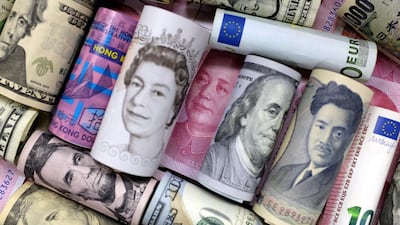Foreign exchange rates have reacted to comments from the US Treasury Secretary's endorsement of a weak dollar and the British chancellor's satisfaction with a strengthening sterling, comments that drew criticism from the IMF.
A day before US President Donald Trump’s arrival at the Swiss ski resort, his top economic minister Stephen Mnuchin sent the dollar tumbling by saying a weak currency is good for exports.
"Obviously a weaker dollar is good for us as it relates to trade and opportunities,” Mr Mnuchin told reporters in Davos. The currency’s short term value is 'not a concern of ours at all,' he said.
The greenback, extending its 2018 slide as Mr Mnuchin spoke, is now at its lowest level since December 2014. The euro also climbed to its strongest against the dollar since 2014, while gold rose to as much as $1,366.15 an ounce on Thursday, its best mark since August 2016, before paring gains. A weak US dollar and fears of an equity market correction are sparking interest in gold.
Investors have sold the US dollar in part because of concern over Mr Trump’s protectionist push, highlighted by this week’s slapping of tariffs on solar panels and washing machines.
It is a message Mr Trump is likely to send in person on Friday when he becomes the first US president in 18 years to address the Davos gathering of corporate executives and investors who tend to favour free trade.
“The most recent appreciation in the euro against the dollar largely reflects dollar weakness related to political risk in the US," said Danielle Haralambous, UK analyst at the Economist Intelligence Unit. "Political risk is likely to remain high in the euro zone this year, but we expect the region's economic recovery to provide support for the single currency."
Mr Mnuchin’s remarks were seen by markets as a departure from traditional US currency policy and a sign that the Trump administration is stepping up its attack on China and other big trading partners as part of its "America First" agenda.
_______________
Read more:
Gold could climb to four-year high of $1400 an ounce, analysts say
Euro strength may curtail quick ECB interest rate hike
_______________
"It's a further sign that the dollar doesn't have that historic policy support anymore," Connor Campbell, markets analyst at SpreadEx, told The National. "It will also raise fears about the risk of global currency wars again – although we should be careful not to read too much into an errant comment made at Davos."
Speaking on Thursday, International Monetary Fund Managing Director Christine Lagarde urged Mr Mnuchin to explain his comments.
“I really hope that Secretary Mnuchin has a chance to clarify exactly what he said,” Ms Lagarde said in Bloomberg TV interview at Davos. “The dollar is of all currencies a floating currency and one where value is determined by markets and geared by the fundamentals of US policy.”
She also reiterated the IMF’s view, presented in its World Economic Outlook this week, that the US tax reform is likely to lead to dollar’s strengthening in the medium term.
Mr Mnuchin, however, downplayed the issue on Thursday, insisting the Trump administration "believes in free currencies" and was "not concerned with where the dollar is in the short term".
He also denied that America is trying to launch a trade war, insisting that the US doesn’t want less trade, it wants “fair trade”.
Meanwhile, UK Chancellor Philip Hammond used an interview at Davos to stress that he is “very happy” with the strength of sterling, as the British currency soared to its highest level since the Brexit vote.
“Over the past few days, we’ve seen the pound appreciate against the dollar quite rapidly, but it’s pretty stable against the euro,” Mr Hammond told Bloomberg TV, as the currency pushed past $1.43. “So we’re very happy with where the currency is at the moment.”
Sterling's recent strength is partly driven by expectations of an earlier-than-expected UK rate rise, given strong data including Wednesday's employment and wages figures. But the weak greenback is also a major driver, helped by Mr Mnuchin's comments.
"It's really dollar weakness, rather than sterling strength," Alan Clarke, an economist at Scotia Bank, told The National. "Against the dollar, sterling has appreciated by 6.6 per cent since November 1, which is when the Bank of England raised interest rates. But if you look at a basket of currencies reflecting the UK's main trading partners, sterling's only up by about 2.2 per cent."
Mr Hammond said inflation was peaking and sterling appreciating as the economy recovered from the initial shock of the Brexit vote in 2016. "It looks as though inflation has peaked now ... I would expect inflation to begin to decline," he told the World Economic Forum on Thursday.
Turning to Mr Mnuchin, he added: "And we seem to be recovering quite a bit more, Steve, thanks very much."
Against the euro, sterling is broadly unchanged, down just 0.01 per cent at €1.1473. But the euro continues to climb against the dollar, 0.11 per cent better at $1.2421. Since the beginning of 2017, the euro has risen 18 per cent against the dollar.
The single currency was stoked by the minutes of the European Central Bank's December meeting, which revealed the governor's plan to "revisit" its quantitative easing policy early this year.
However, the ECB left its massive support for the eurozone economy in place on Thursday, opting not to rock the boat further after Mr Mnuchin’s comments.
The Frankfurt institution left interest rates at historic lows and held fast to plans to buy €30 billion of government and corporate bonds per month until September, offering no hints about when it might step back from the mammoth stimulus programme.

